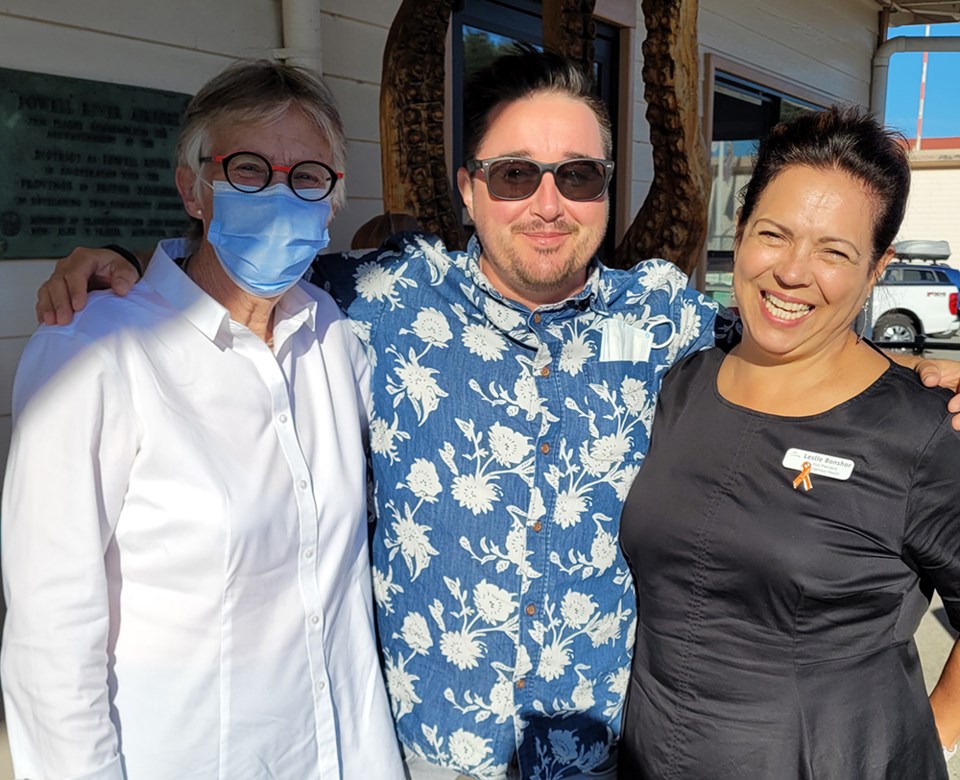Tla’amin Nation member Davis McKenzie has been named to the Vancouver Coastal Health (VCH) board of directors.
McKenzie, whose traditional name is aʔǰɛmaθot, said his interest in health care partially stems from the fact that for 12 years, he lived a block away from Vancouver General Hospital (VGH), 250 metres from some of the best health care in Canada.
“We lived so close that our apartment windows would rattle two or three times a day, announcing the air ambulance, bringing patients from across the province into VGH,” said McKenzie. “It was a daily reminder for me of how VCH is unlike any other regional health authority in this province. Most families at some point will require the special services that are offered through VCH, and I think it’s this special place in the health-care system that makes VCH seem like a unique and exciting opportunity.”
In terms of his involvement on the VCH board, McKenzie said he knows the leadership created a commitment to expand Indigenous representation from the many different communities of care. He said that chief Marilyn Slett from the Heiltsuk Nation and former councillor Debra Baker from Squamish Nation already serve on the board.
“I expressed my interest, filled in a very complicated application, and I was ultimately successful,” said McKenzie.
He added that moving back to Tla’amin territory, it’s a completely different health-care environment than the city, and it’s that which he wants to represent.
McKenzie said that as a transgender person he has specific health care needs, so that continuity of care, moving back home, is different than in the city. He said getting some of his health care in Tla’amin and some from qathet General Hospital, the one-stop model he had come to rely on in Vancouver doesn’t exist here.
“It’s a small, rural model and requires a lot of travel and coordination with outside providers,” said McKenzie. “There’s lots of issues around harmonization of services, so being on the board just felt like a unique challenge.
“Working for a dozen years for the First Nations Health Authority had given me some experience in health and understanding the environment. I just wanted to figure out how to contribute in some way and learn along the way.”
McKenzie said what he has been sharing at the board in the meetings he has attended is that it is almost a tale of two health authorities within one. He said there is the city, which has most of the staff, most of the activity and most of the budget, and then there is the coastal community of care.
“There are much different health-care environments in one, but my strong interest in being there is to bring the voice of qathet and the rural health care experience,” said McKenzie. “I don’t expect us to necessarily have everything here that is available in the city, but I do feel passionate about having great care here for Tla’amin and all members of qathet region. I look forward to contributing in any which way I can.”
COVID concerns
In terms of his focus, McKenzie said one thing everyone has experienced is the pandemic. He said it is not over yet and one of his main concerns is not losing momentum around protective health measures, such as vaccinations.
“The sun came out and we’ve started to feel freedom,” said McKenzie. “We’ve put COVID-19 in our rear-view mirror. I’m not sure it’s safe to do so yet, even though I know we all want to move on with our lives.”
McKenzie said on the preventative side, vaccinations for younger kids are soon going to be available in this region.
“It has been rigorously reviewed and I think we want to encourage people to keep on vaccinating,” said McKenzie. “Also, it’s important to keep up with boosters.”
McKenzie said people are still getting very sick and dying from COVID-19.
“Let’s not lose momentum,” he added.
Cultural safety
Secondly, he said as an Indigenous person, he’s always concerned about cultural safety, and he is very interested in the complaints processes.
“How can any member of the public complain when health care they receive is not up to snuff?” asked McKenzie. “How can they get good answers about how that process wound itself through the system and what were the outcomes of that process? What can be changed and what can be improved?”
McKenzie said a third strong interest is around the adaptations of technology in health care. He said this involves things such as taking appointments online.
“Those types of conveniences are things that people look for in their day-to-day lives now,” said McKenzie. “I also think that as a health authority and public service provider, I’m encouraged by the ways we are starting to think ahead and adapt. People have become used to doing things in a different way and we need to walk alongside those patients so they continue to be attached to care.”
In terms of the renaming of the hospital to qathet General Hospital, McKenzie said he thinks it will resonate well in the Tla’amin community, but also, in the broader community.
“Hospitals are places of healing and places to receive care,” said McKenzie. “As a Tla’amin person, that name [Israel Powell] carries sickness. I believe that names have a spiritual power and an energy of their own. Lifting that name off the hospital and putting qathet there, I think it immediately creates safety in that space for Tla’amin people, and residents, generally. It’s not only us in Tla’amin who carry the burden of that name, it’s every resident in the qathet region.
“The hospital name change increases the safety of this place and transforms it into a place of healing.”
To assist him in his VCH board duties, McKenzie said people can reach out to him with any questions or concerns.
“I’m definitely here to listen,” added McKenzie.
He said he can be found on Facebook.


.jpg;w=120;h=80;mode=crop)